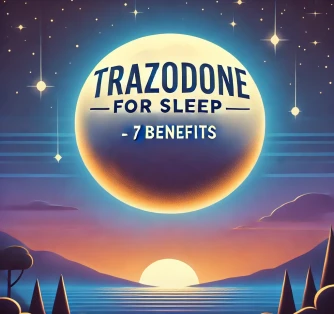Menu
Weight loss
Hormones
Sex
EXPLORE
MEET NU IMAGE MEDICAL
TREATMENTS
MEET NU IMAGE MEDICAL
TREATMENTS
MEET NU IMAGE MEDICAL
7 Benefits of Trazodone You Didn’t Know About


Why consider trazodone for sleep?
Trazodone is often recognized for its role in treating depression, but many are unaware of the potential benefits it may offer for sleep. If you're struggling with insomnia or poor sleep quality, trazodone might be an option worth considering. In this article, we’ll explore seven potential benefits of using trazodone for sleep that you might not have known about, helping you understand why this medication has become a popular choice for those seeking better rest.
1. Non-habit forming
One potential advantage of trazodone is that it is generally considered non-habit forming when used as a sleep aid. Unlike some other sleep medications, such as benzodiazepines (e.g., Valium and Xanax), trazodone does not carry the same risk of dependency. This characteristic may be particularly important for those who need ongoing support to manage sleep disorders without the worry of developing a dependence on the medication.
2. Enhances sleep quality
Trazodone is known to potentially improve sleep quality by increasing the duration of slow-wave sleep (SWS), which is often considered the most restorative phase of sleep. SWS is crucial for physical recovery and cognitive function, and trazodone’s ability to support this sleep stage might lead to more refreshing and rejuvenating rest. This potential improvement in sleep quality can have a positive impact on your overall well-being, making it easier to face the challenges of the day.
3. Reduces sleep latency
Sleep latency refers to the amount of time it takes to fall asleep after getting into bed. Trazodone may help reduce sleep latency, making it easier for you to drift off quickly. This could be particularly beneficial for individuals who struggle with racing thoughts or anxiety that keeps them awake at night. By potentially helping you fall asleep faster, trazodone might reduce the frustration and stress that often accompany insomnia.
4. Low dose, high effectiveness
Trazodone’s effectiveness as a sleep aid can often be achieved even at low doses, typically between 25mg to 100mg. Studies have suggested that these lower dosages may be effective and could cause fewer side effects, such as daytime sleepiness. This means that you might benefit from its sleep-enhancing properties without needing to take high doses, thereby reducing the risk of side effects. This low-dose efficacy makes trazodone a practical option for those who are sensitive to medications or who prefer to start with a minimal dosage to manage their sleep issues.
5. Helps regulate serotonin levels
Trazodone works by increasing the availability of serotonin in the brain. Serotonin is a neurotransmitter that plays a key role in mood regulation and sleep. By helping to balance serotonin levels, trazodone not only may promote better sleep but also contribute to an overall sense of well-being. This dual action makes trazodone a versatile option for those looking to improve both their sleep and mood.
6. Versatile in treating sleep disorders
While trazodone is often used to treat insomnia, it can also be effective for other sleep disorders, including sleep disturbances associated with depression, anxiety, and chronic pain. This versatility makes trazodone a valuable tool for healthcare providers who need to address multiple conditions that impact sleep.
7. Minimal side effects at low doses
At the low doses typically prescribed for sleep, trazodone tends to have minimal side effects. Common side effects like drowsiness or dry mouth are often mild and manageable, and many patients find that these diminish over time as their body adjusts to the medication. This tolerability makes trazodone an appealing option for those who have experienced more severe side effects with other sleep aids.
In conclusion, Trazodone offers a range of potential benefits that make it an attractive option for those seeking to improve their sleep. From its non-habit forming nature to its ability to enhance sleep quality and reduce sleep latency, trazodone provides a versatile and effective solution for sleep issues. If you’re considering trazodone for sleep, it’s important to consult with your healthcare provider to determine if it’s the right choice for you.
Sources:
This article is for informational purposes only and does not constitute medical advice. The information contained herein is not a substitute for and should never be relied upon for professional medical advice. Always talk to your physician about the risks and benefits of any treatment. Nu Image Medical may not offer the medications or services mentioned in this article.
